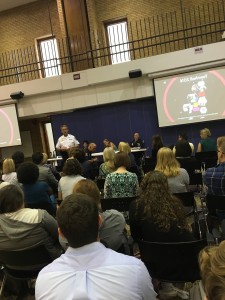On September 15th, members from the EHE community and regional law enforcement gathered to discuss the current state of violence in the United States. The panelists included Dr. Mollie Blackburn (Professor of Literacy Studies), Alice Ragland (EHE Graduate Student), and Deputy Chief Spears-McNatt (Columbus Police Department).
The conversations were just as important as they were emotional, difficult, and unfinished. Dr. Blackburn was kind enough to share a powerful written contribution, which lends itself to further conversations, thinking, and action. Please read and comment:
“As you heard in my introduction, much of my work has focused on LGBTQQ people, and as person who identifies as queer, violence against LGBTQQ people infuriates me, pains me, and, let’s be honest, scares me too. But as a white person, I cannot ignore that much of this violence is inflicted not just on queer bodies but also brown and black bodies.
Among the 49 people killed in Pulse, almost all of them were people of color, with the vast majority being Latino. Among the 20 trans people who have been killed in the United States in this year alone, almost all of them were African American, the vast majority of whom were women.
Let’s bring this home to Ohio. Skye Mockabee was 26 years old when she was found dead, face down, bleeding from her mouth, in a parking lot in Cleveland on July 30th. Rae’Lynn Thomas was 28 years old when she was shot and killed by her mother’s ex-boyfriend, who said she was Satan, in Columbus less than 2 weeks later on August 10th. Both women were trans. Both were African American. Here. In Ohio.
Of course I am infuriated. Of course I am pained. Not because I am trans, and not because I am a person of color, but because I am a person.
It seems virtually impossible to be an advocate for LGBTQQ people and not be an advocate for people of color. It just doesn’t make any sense to me.
But just as I am infuriated and pained, I am also afraid. Not because I believe the likelihood of this happening to me is like that of trans women of color or queer people of color. I know it is not. I am not scared for my life. Not in the same way. And it’s my job, as a white person, to know the difference.
It is my job, as a colleague, to figure out the times when I should stand up and be heard (not always leaving all of the hard talk up to women of color, for example), and when I should sit down, shut up, and listen. (I should say this is always a struggle for me; but it is my job to stay in the struggle.)
It is my job, as a scholar, to study the work of scholars of color so that I might better understand the world and the people in it, including but not limited to the people with whom I conduct research. This requirement is amplified when the people with whom I am working are people of color.
It is my job, as a teacher of LGBTQQ-themed literature, to teach people like Langston Hughes, Bayard Rustin, Audre Lorde, and Pat Parker. It is my job to read with students texts like Huey P. Newton’s speech to the Black Panthers about Women’s and Gay Liberation.
It is my job to find opportunities for acting in solidarity, to do the equivalent of Rapinoe, a gay white soccer player, taking a knee in solidarity with Kaepernick.
I know these acts are small, too small, but I also believe in the small acts. Small acts in which we join together in our fury, in which we feel but also sooth one another’s pain, and which we work together to counter the forces that cause pain. Small acts. Acts of love, respect, and solidarity.”
by Dr. Mollie Blackburn

Thank you, Dr. Blackburn, for your deeply personal and moving statement. Your statement ends with a call for all of us, in our own way, to find acts that bring greater awareness and action on behalf of all persons whose lives are threatened by violence and hate. You call them small acts, but they are not small, really. In my research with social justice identity development in counselors, I have found that small acts DO have impact, as they make a statement of allyhood and alliance, and then they empower other small acts, which become bigger acts, which further empower others to act. Like ripples on a pond, small acts ring out, intersecting with other acts, and then a movement is born and gains wings. For those who were able to attend this presentation, and for the many more who will read Dr. Blackburn’s words, take courage — we can all take a knee, attend a rally, reach out to a person who is oppressed and offer them your hand to help, your voice to speak when it’s time, and your ear to listen and learn ways to help. The key is to act.